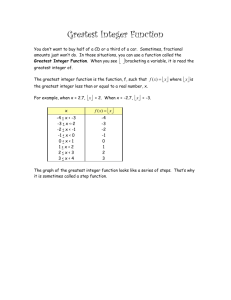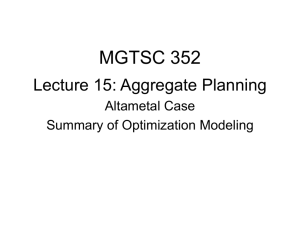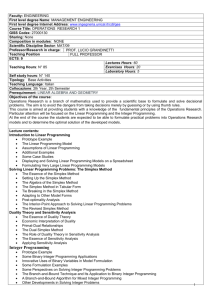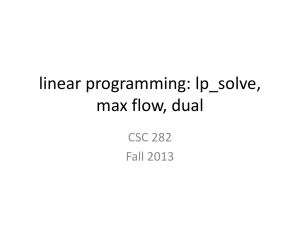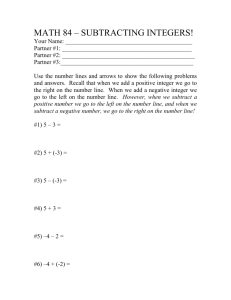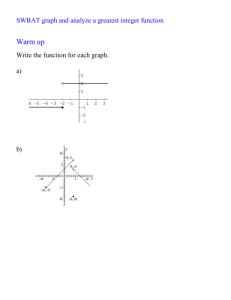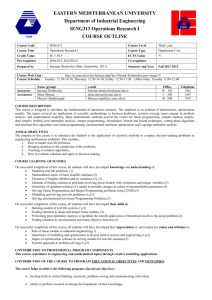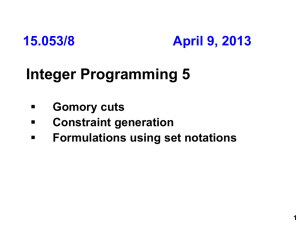Solution #5
advertisement
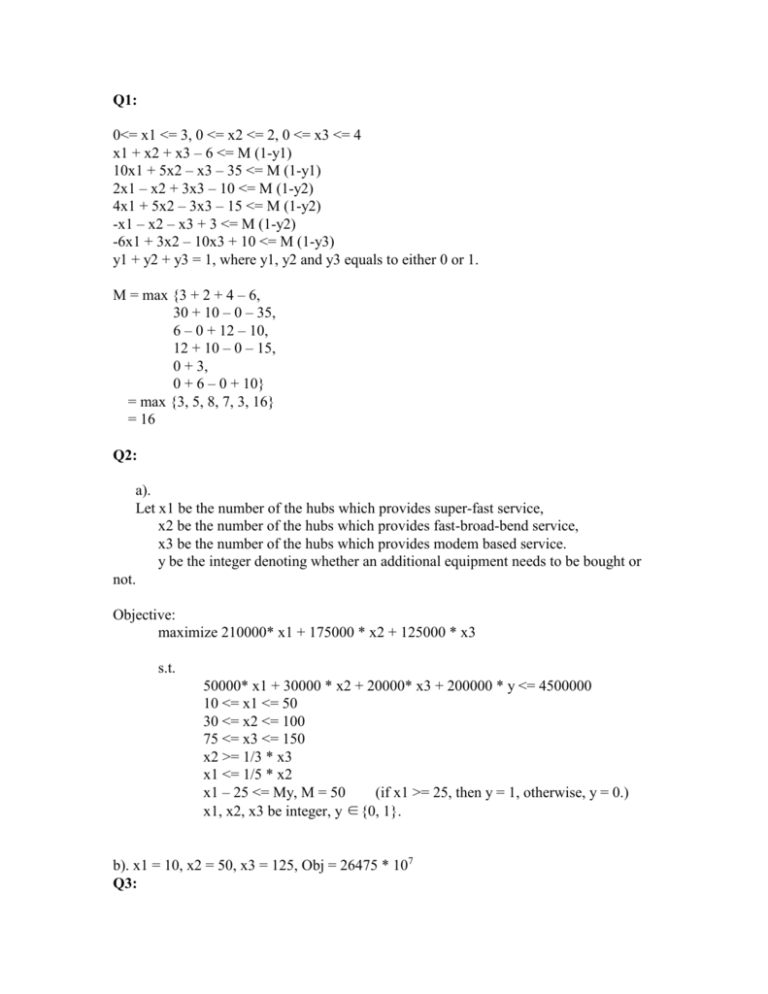
Q1:
0<= x1 <= 3, 0 <= x2 <= 2, 0 <= x3 <= 4
x1 + x2 + x3 – 6 <= M (1-y1)
10x1 + 5x2 – x3 – 35 <= M (1-y1)
2x1 – x2 + 3x3 – 10 <= M (1-y2)
4x1 + 5x2 – 3x3 – 15 <= M (1-y2)
-x1 – x2 – x3 + 3 <= M (1-y2)
-6x1 + 3x2 – 10x3 + 10 <= M (1-y3)
y1 + y2 + y3 = 1, where y1, y2 and y3 equals to either 0 or 1.
M = max {3 + 2 + 4 – 6,
30 + 10 – 0 – 35,
6 – 0 + 12 – 10,
12 + 10 – 0 – 15,
0 + 3,
0 + 6 – 0 + 10}
= max {3, 5, 8, 7, 3, 16}
= 16
Q2:
a).
Let x1 be the number of the hubs which provides super-fast service,
x2 be the number of the hubs which provides fast-broad-bend service,
x3 be the number of the hubs which provides modem based service.
y be the integer denoting whether an additional equipment needs to be bought or
not.
Objective:
maximize 210000* x1 + 175000 * x2 + 125000 * x3
s.t.
50000* x1 + 30000 * x2 + 20000* x3 + 200000 * y <= 4500000
10 <= x1 <= 50
30 <= x2 <= 100
75 <= x3 <= 150
x2 >= 1/3 * x3
x1 <= 1/5 * x2
x1 – 25 <= My, M = 50
(if x1 >= 25, then y = 1, otherwise, y = 0.)
x1, x2, x3 be integer, y ∈{0, 1}.
b). x1 = 10, x2 = 50, x3 = 125, Obj = 26475 * 107
Q3:
a). Solve by Gomory cuts:
(1) If the coefficients in the original problem are not all integer, transform them into
integer:
Min – x1 + 3* x2
s.t.
5* x1 + 6*x2 <= 8
-3* x1 + 5* x2 <= 7
x1, x2 >=0
x1, x2 are integer
(2) Written in the standard form:
min – x1 + 3* x2
s.t.
5* x1 + 6*x2 + x3
=8
-3* x1 + 5* x2
+ x4 = 7
x1, x2, x3, x4 >=0
x1, x2 are integer
(3) Solve with Primal Simplex Method
x3
x4
0
8
7
x1
1
5*
-3
x2
-3
6
5
x3
0
1
0
x4
0
0
1
x1
x4
-8/5
8/5
59/5
x1
0
1
0
x2
-21/5
6/5
43/5
x3
-1/5
1/5
3/5
x4
0
0
1
Cut for x1:
x1
x4
x5
-8/5
8/5
59/5
-3/5
x1
0
1
0
0
x2
-21/5
6/5
43/5
-1/5
x3
-1/5
1/5
3/5
-1/5*
x4
0
0
1
0
x5
0
0
0
1
x2
-4
1
x3
0
0
x4
0
0
x5
-1
1
Solve with Dual Simplex Method
x1
-1
1
x1
0
1
x4
x3
10
3
0
0
8
1
0
1
1
0
3
-5
The solution is:
x1=1, x2=0, x3=3, x4=10, x5=0
Objective value= -1
b). Totally there are four possible Gomory cuts:
lower or upper fractional cuts on x1, …
lower or upper fractional cuts on x4, …
Q4:
(1) If the coefficients in the original problem are not all integer, transform them into
integer:
Min – x1 - 3* x2
s.t.
5* x1 - 6*x2 <= 8
-3* x1 + 5* x2 <= 7
x1, x2 >=0
x1, x2 are integer
(2) Written in the standard form:
min – x1 - 3* x2
s.t.
5* x1 - 6*x2 + x3
=8
-3* x1 + 5* x2 + x4 = 7
x1, x2, x3, x4 >=0
x1, x2 are integer
(3) Solve with Primal Simplex Method
x3
x4
0
8
7
x1
1
5*
-3
x2
3
-6
5
x3
0
1
0
x4
0
0
1
x1
x4
-8/5
8/5
59/5
x1
0
1
0
x2
21/5
-6/5
7/5*
x3
-1/5
1/5
3/5
x4
0
0
1
-37
x1
0
x2
0
x3
-2
x4
-3
x1
x2
82/7
59/7
1
0
0
1
5/7
3/7
6/7
5/7
Cut for x1:
x1
x4
x5
-37
82/7
59/7
-5/7
x1
0
1
0
0
x2
0
0
1
0
x3
-2
5/7
3/7
-5/7*
x4
-3
6/7
5/7
-6/7
x5
0
0
0
1
x2
0
0
1
0
x3
0
0
0
1
x4
-3/5
0
1/5
6/5
x5
-14/5
1
3/7
-7/5
Solve with Dual Simplex Method
x1
x4
x3
-35
11
8
1
x1
0
1
0
0
The solution is:
x1=11, x2=8, x3=1, x4=0, x5=0
Objective value= -35
b). Solved by Xpress: x1 = 11, x2 = 8, obj = -35

